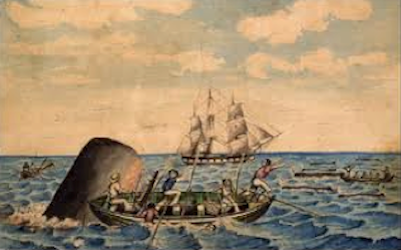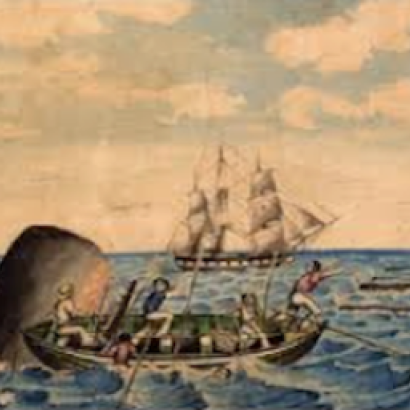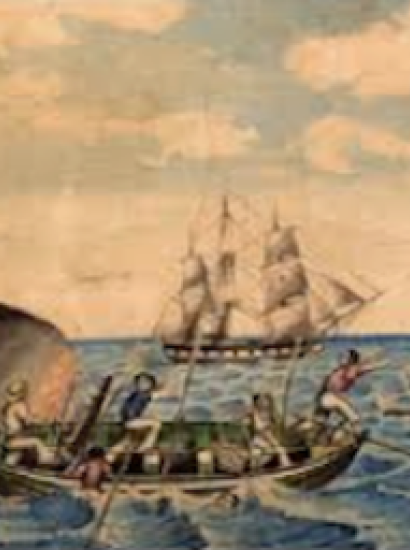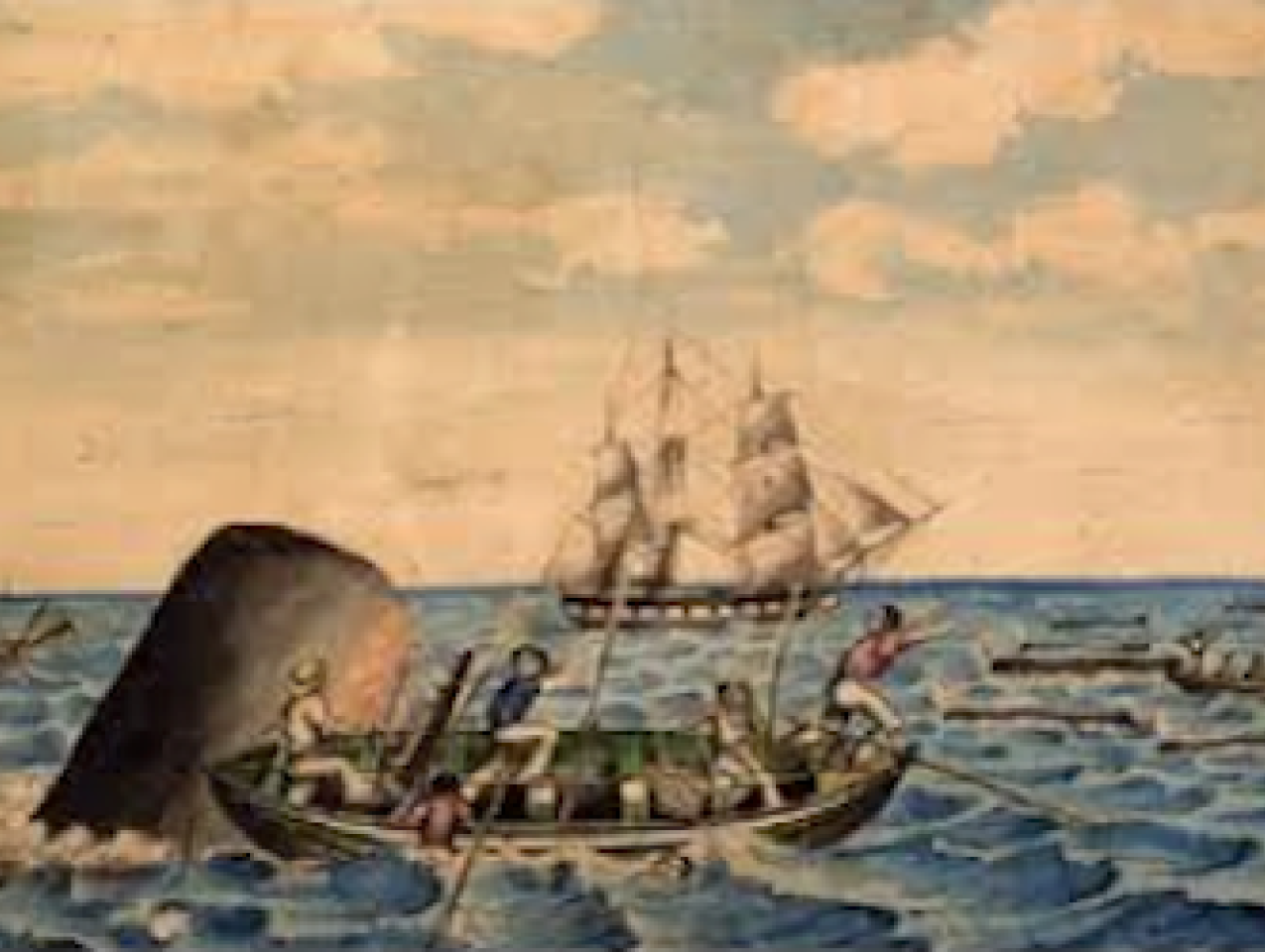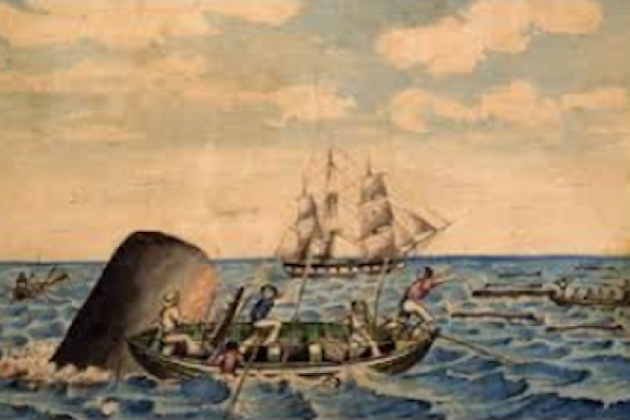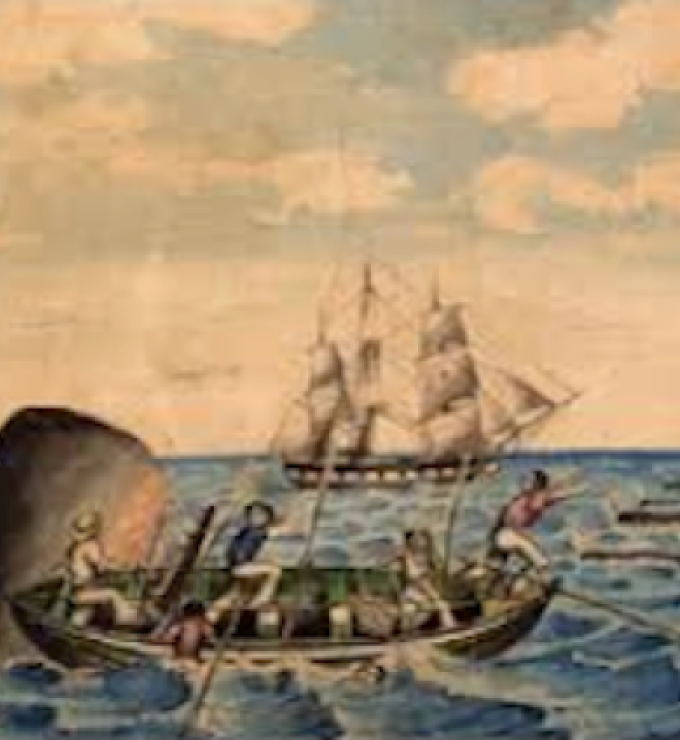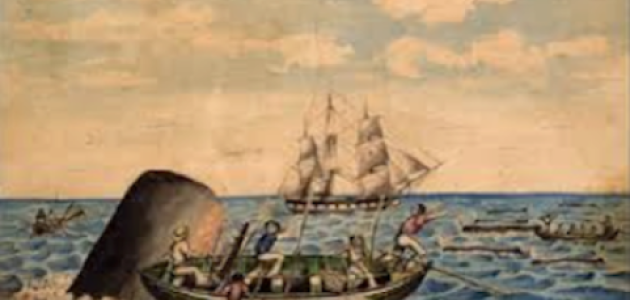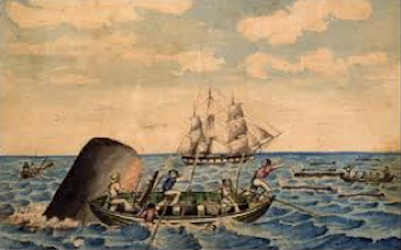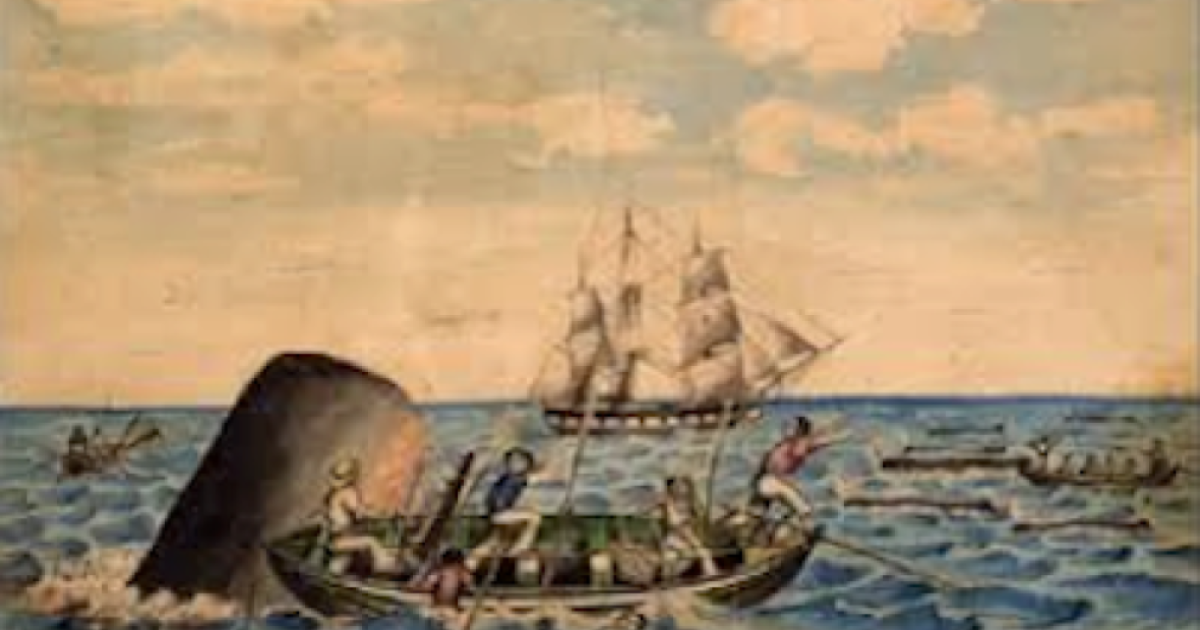- Regulation & Property Rights
- Law & Policy
The Politics of Whales
Whales are an open-access resource—that is, they swim the high seas (some species stay closer to shore); are owned by no one; and are vulnerable to overexploitation.
Historically, whales were extremely valuable for meat. Spermaceti, oil, and ambergris from sperm whales was used in perfumes, cosmetics, candles, and soap; and baleen (from the top of whales’ mouths) was used to make buggy whips, fishing poles, corset stays, and dress hoops. More importantly, whales were swimming oil wells—whale oil was vital for illuminating homes and businesses throughout the world in the nineteenth century, and whale oil lubricants ran the machinery of the Industrial Revolution. (After all, it took place before the widespread discovery and use of petroleum.)
Finding whales was the central goal of many American vessels, their captains, and crews. New Bedford and Nantucket, both in Massachusetts, were famous as whaling centers. Herman Melville’s Moby Dick; or, The Whale (1851) documented the epic battle between Captain Ahab and a white sperm whale that had bitten off one of his legs.
But all of this pressure on the open ocean had consequences. Since the golden age of whaling world wide in the nineteenth and early twentieth centuries, overharvest brought serious declines in many of the world’s whale populations. This outcome truly reflected Garrett Hardin’s Tragedy of the Commons.
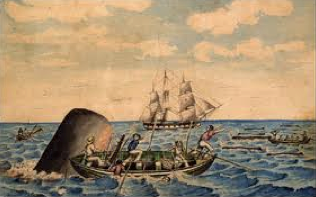
Photo credit: National Marine Sanctuaries
Since 1986, there has been a ban on commercial whaling under the International Whaling Commission’s (IWC) moratorium. In a dramatic switch, the United States has gone from being one of the world’s great whaling nations to being one of the most ardent supporters of the ban. But not everyone agrees that the moratorium is justified for all of the species of whales it covers. Since 1986, Japanese fleets have harvested whales under “scientific permits,” which are allowed by the IWC, despite condemnation against them by anti-whaling groups. Indeed, Japan is subject to periodic resolutions at IWC meetings to halt whaling. At the same time, the Commission acknowledges the economic hardship imposed by the moratorium on Japanese whaling communities.
Russia has opposed the moratorium even though it is a member of the organization. Canada withdrew from the IWC in 1982 to protest prohibitions on small-scale whaling and has been called on by the IWC to halt whaling and return to the Commission. Norway and Iceland persist in whaling in limited amounts and issue their own annual quotas. The IWC allows limited annual aboriginal “subsistence” harvest quotas that citizens of the United States, Denmark, and Russia take advantage of.
Despite the moratorium, anti-whaling non-government organizations such as Greenpeace, the World Wildlife Fund International, and the Cousteau Society charge that whaling continues to draw down stocks. Overall, documented whaling accounts for annual harvests of about 2,000 whales per year, and there likely are more unreported harvests.
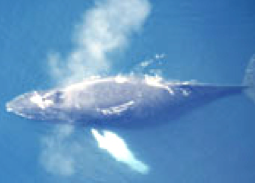
Photo credit: International Whaling Commission
The purpose of the IWC is “safeguarding for future generations the great natural resources represented by the whale stocks.” The organization’s original members consisted only of the fifteen whale-hunting nations, but since the 1970s, many countries with no previous history of whaling, including some that are landlocked like Switzerland and Mongolia, have joined the IWC. The IWC also allows allow non-member parties, such as intergovernmental organizations and non-government organizations, primarily environmental groups, to attend the meetings and to be represented by observers if they meet certain requirements. This shift reflects the politicization of whale conservation. In recent years, the IWC meetings have attracted international media attention due to the growth of the anti-whaling movement that began in the 1970s.
In the last four decades, anti-whaling groups mounted lobbying campaigns with support from environmentalists and the anti-whaling block of IWC members to change the composition of the IWC’s membership. The new membership brought about the necessary majority vote to implement the moratorium on commercial whaling. Since that time, pro-and anti-whaling countries and groups have campaigned for their respective positions among both the existing and new membership. China may have joined after the World Wildlife Fund promised to provide $1 million to fund a panda reserve. Representatives of small developing countries have their dues and the travel support covered by environmental groups, while Japan and other pro-whaling countries provide “aid” in support for positions on IWC votes. The United States, at the behest of a strong environmental lobby, has threatened Japan and other whaling countries with restrictions on their other fleets in accessing U.S. fishing grounds within the 200-mile Exclusive Economic Zone as well as restrictions on the import of fish products from any offending country.
The United States first incorporated the IWC’s policies into domestic law in the 1971 Pelly Amendment to the Fisherman's Protective Act of 1967. This amendment authorizes the Secretary of Commerce to notify the President if any country’s fishing is diminishing the effectiveness of an international fishery conservation program (including the IWC’s program). The President then has discretion to limit fish imports from that country. The United States has used sanctions under the Pelly Amendment on numerous occasions to force other countries to support its position in IWC votes.
We need to give whalers a stake in the survival of the stock.
The problem with all of this lobbying and politicking is that it is contentious, poisonous, and offers little motive for developing needed scientific evidence about the true conditions of whale stocks. This situation also makes it impossible to create incentives to protect those species that need protection. Misinformation, moralizing, and emotion are traded on both sides. In this environment, it is difficult to have a reasoned discussion of what the appropriate benchmark should be for maintaining or ending the moratorium on harvest.
Should the benchmark be Preindustrial-harvest levels as is often referenced? Or should it be an estimate of the stock necessary to sustain the species? Surely the former is a very rigid, and perhaps unrealistic objective. Would the United States support returning North American bison populations to their pre-industrial harvest levels? Of course not. The second objective requires considerable scientific information, much of which may not exist. But experience in fishery management reveals that involving fishers, who depend upon a species, know it, and traverse its habitat frequently, is a valuable tool for obtaining such information.
But under the current hostile setting where whalers are viewed as bandits or worse, there is little incentive or means for cooperation. Fleets from countries such as Canada, Norway, Iceland, and Japan also gather useful information, but these nations are condemned for their whaling so any information they would provide would be viewed with suspicion. It is a tragically lost opportunity.
Finally, there are financial considerations that, in today’s environment, cannot be weighed in an informed manner. Large amounts of money are spent annually by the IWC and other organizations to gather data on whales, to analyze it in yearly meetings, and to police the moratorium. Anti-whaling groups raise funds to support their efforts to harass whaling vessels. Whaling nationals engage in costly and sometimes dangerous efforts to avoid confronting environmentalists. Communities that have depended on whaling suffer declines. But no one knows the opportunity costs of the moratorium for each species.
***
Surely, given the numbers reported below, some whales could be harvested in particular areas with little damage to the stock. But any discussion of removing species from the moratorium, like the humpback whale, which has successfully rebounded from endangered status, meets intense opposition. A movement to review the ban on whaling and allow for regulated harvest under the Revised Management Scheme of the IWC is stalled. There is no secret voting in the IWC meetings, which allows opponents to observe who is with or against them. A resolution to allow the secret ballot was defeated.
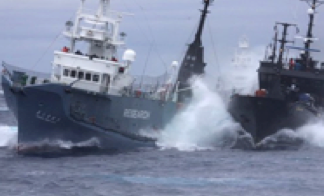
Photo credit: Mother Nature Network
It is obvious that the politics of whale conservation has created a dysfunctional and adversarial setting that is ripe for reform. Property rights and markets offer a better, less costly, and more collaborative way to save the whales.
The Evidence
The data below primarily are from the IWC. Many whale populations are not known with precision. Further, some stocks are very local whereas others are widely dispersed and migrate over wide ranges. Stock estimates also are affected by other environmental factors, such as food supply, accident mortality (colliding with ships, by-catch in fishing), and water quality. The IWC has a scientific committee that collects data and algorithms to estimate what populations are required to meet sustainable stock levels. Assessing the “fitness” of the population (reproductive success, growth trends) for any harvest is very controversial. Currently, whaling, because it is so constrained, likely has minimal impact on stock levels.
Whale Stock Estimates
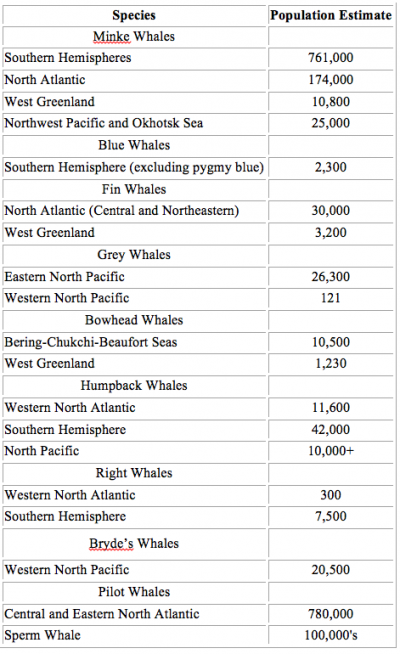
Credit: IWC
A Property Rights Alternative
How can we get beyond all of this politics and moralizing to a more rational approach to managing whales? How can we recognize that some species could be harvested (as they will be anyway) in a constrained fashion that promotes collaboration and protects those species that require it and reduces the costs of the current arrangement?
A recent article by Christopher Costello, Leah Gerber, and Steven Gaines in Nature outlines a reasonable approach. It builds on the successful management of many fisheries, where annual total allowable catches are set and then distributed as shares among fishermen. These are often called individual transferable quotas (ITQs). They are assigned through past catch histories and in some countries, like New Zealand and Iceland, are strong long-term property rights, giving fishermen a stake in the survival of the stock, and an ability to trade quotas and consolidate or diversify as economic conditions warrant.
I describe a market for whales that is somewhat more open than the one outlined in Nature. Annual maximum catches would be determined for each whale stock that was designated as healthy. This of course would require collaboration between whalers and scientists, but in a new environment, such cooperation would be feasible. With a value attached to whales, as outlined below, opportunity costs emerge for banning whaling, encouraging the selection of a reasonable benchmark for determining a species’ stock status and a corresponding algorithm for setting annual harvests.
With a total harvest set, quotas would be distributed to members of the IWC, who could then distribute them among their citizens in any manner they chose or retire them. The initial allocation would be weighed toward countries with historical catch histories, but some quotas could be granted to countries with no past whaling record. Distributed quotas would be useable or tradable to anyone, including whalers, and pro- or anti-whaling countries or groups. The fewer the restrictions on trade the better, and the quotas would be recognized property rights held in perpetuity. The number of whales ultimately hunted would depend on who owned the quota. The authors of the Nature article estimate that the per-whale values or costs to those wishing to reduce harvest likely range from $13,000 (for abundant Minke) to $85,000 (for less abundant Fin).
When environmentalists purchase shares from whalers, the result is more whales.
Such market trades could allow for all parties to be made better off and harvests for some species to be reduced to zero, whereas others could have “legal” and unharassed whaling. When environmentalists purchase shares from whalers, they benefit from the increased whale populations, and whalers benefit from receiving income that can be put to other use. This is not only a win-win opportunity, but it depoliticizes whaling, and creates a framework for protecting species that require it and allowing some harvest for others whose stocks appear vibrant.
Currently, any country may opt out of whaling agreements and harvest any species at any level. Further, there is no clear sense of the value of whaling or of maintaining any particular stock size. Now, these questions of value or stock size are resolved through lobbying, pressure politics, and emotion rather than through science and trade. The authors estimate that total annual profit from all global whaling activity is on the order of $31 million. A conservative estimate of money spent annually by non-profit organizations on anti-whaling is $25 million, suggesting that these competing values are of similar magnitude. And market trades likely would reduce the costs of conserving species. The self-report by the Sea Shephard Society for its multi-million dollar 2008 campaign saved about 350 minke whales in Antarctic waters. By the estimates given in the Nature article, those whales could have been “purchased” in a whale conservation market for less than $4 million.
Obviously, the design of this proposed whale market would require care through the creation of a global vessel registry and monitoring using GPS and other satellite systems as well as through observation at landing. All of this can be done and, if accomplished correctly, such a market could address important concerns such as how to balance whales with the fish they consume, how to avoid the by-catch of whales in fisheries, and how to limit deadly ship strikes of whales. The market could also satisfy the desire to conserve species. By placing an appropriate price on a whale, the market provides a value for each whale, creating incentives for conservation, reasoned harvest, and the avoidance of accidental mortality.
A well-designed whale market would take whaling out of politics and headline-grabbing, and reduce the dangerous encounters on the high seas between antagonists. It can ensure cooperation in the conservation of whales, a goal that all parties desire, but that the current IWC arrangement cannot provide.







